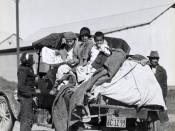Question: Does being from a non-English speaking background impact upon job choice in Australia?The main problem addressed in this assignment is about communication through language at work and how this affects the type of work people do. A Case Study of an embroidery workshop will help us to understand why a particular industry may be dominated by workers who have little if any knowledge of the English language. Some of the main problems that we plan to address are outlined below.
CommunicationÃÂDoes this lead to labour intensive jobs?ÃÂLanguage as a cultural barrierÃÂRecruitment processesCultureÃÂAustralian culture versus other culturesÃÂCulture as a barrier to other jobs (for example, not fitting into mainstream society, lack of confidence)ÃÂJob cultureÃÂSocial/Cultural pressures or reasons for staying or not staying in a job (for example sending pay to home country due to good currency exchange rates).
Research will be conducted through interviews with six female embroiderers, one female manager and one owner of the business.
We also plan to carry out a brief, confidential questionnaire to all employees to gain further information. We hope to supplement this with documentary analysis of newspaper/journal articles and the relevant literature.
We have identified a number of relevant literatures so far. Firstly, Shamsuddin (1998) discusses the probability of non-English speaking background (NESB) persons being employed and how the NESB labour supply is affected by the market (Shamsuddin, 1998: 105). Secondly, Wooden and VandenHeuvel (1997) discuss participation rates and the effects of NESB immigrant households. They also claim that the employment differences can not be explained by English ability and discuss the reasons for this. They also look into the influence of the extended family (Wooden & VandenHeuvel, 1997:136-8). Evans (1987) also examines the effects of English proficiency and also considers employment in ethnic enclaves (Evans, 1987: 267). Webber, Campbell and FincherÃÂs...



You Failed..!!!
Grade and level may be unspecified..!
This kind of essay though is not..!
In other words... FAILURE..!!!
PS. Strange though it may seem, I've seen worse..!!!
0 out of 0 people found this comment useful.